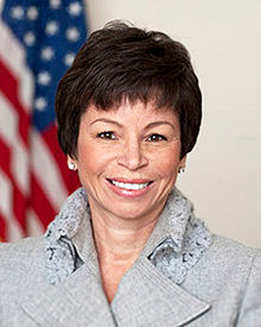|
Champion of African-American History: Carter G. Woodson
By Valerie
Jarrett
From The Huffington
Post
In the fall of 1870, a handful of students made their way
through the northwest quadrant of the nation's capital, and
through the doors of D.C.'s "Preparatory High School for
Colored Youth," the country's first public high school for
African American children. There, in the shadow of the
American Civil War, and dawned with the spark of
reconstruction, a converted basement-turned-classroom in the
lower floor of Fifteenth Street Presbyterian Church bore the
seeds of Dunbar High School, which would become one of the
country's preeminent institutions for African American
educational achievement. The students and teachers who
graced its hallways would be heard through the years in the
halls of Congress, in the highest ranks of the U.S.
Military, at the heart of our civil rights movement, and in
the upper echelons of medical and scientific study.
|

Valerie Jarrett |
|
One such voice was that of Carter G. Woodson; a journalist,
author, historian, and co-founder of the Association for the
Study of Negro Life and History (ASNLH). It was through his
work with the ASNLH that Woodson spearheaded the celebration
of "Negro History Week" in America, which served as the
precursor to Black History Month, which was officially
recognized by President Gerald Ford in 1976.
The son of former slaves, Woodson grew up poor, and unable
to attend school regularly. Still, he managed to master
scholastic fundamentals on his own. After entering high
school at the age of 20, he earned his degree in 2 years and
continued on with an impressive academic career earning a
bachelor's degree from Berea College in Kentucky, a post as
a school supervisor in the Philippines for nearly five
years, a master's degree in 1908 from the University of
Chicago, and his Ph.D. in history from Harvard University in
1912.
After Harvard, Woodson moved to Washington, D.C. and joined
the Dunbar High School staff, which at that point was called
the "M Street School." He taught there for years until
joining the faculty at Howard University, where he began
teaching Howard's first ever black history courses.
Carter Woodson spent his career promoting the importance of
black history as part of the American story, and in context
of the birth and evolution of global civilizations. With the
publication of The Journal of Negro History, the formation
of the ASNLH, and the inception of Negro History Week,
Woodson is often cited as the "father of black history," and
one of the earliest champions of African American
empowerment through historic learning.
Woodson taught us that, "those who have no record of what
their forebears have accomplished lose the inspiration which
comes from the teaching of biography and history."
It was his belief that a thorough and prideful understanding
of our history as Americans, and a full grasp of the
contributions of black people would provide us the
foundation and vision we need to confidently contribute to
society, and reach our full potential.
I was struck by Carter Woodson's story both as we observe
Black History Month at the White House, and as I reflect on
the tangential story of another Dunbar faithful. My father,
Dr. James E. Bowman, who would be 91 years old today,
attended Dunbar and graduated at the age of 16, decades
after Mr. Woodson had moved on, and amidst another era of
struggle and restructuring in America. He would later become
a renowned pathologist and expert in genetics and inherited
disease, as well as the first African American resident at
St. Luke's Hospital in Chicago, and the first African
American to receive tenure at the University of Chicago
Division of Biological Sciences. Like Mr. Woodson, and so
many others over the years, my dad broke down barriers
throughout his life and career, and left us a world better
than the one he found.
Today, Dunbar struggles against many of the same economic,
social, family, and scholastic barriers to success that face
so many schools in America, and which leave too many
children fighting for the chance they deserve. But we can
certainly learn from Carter Woodson, that we need only look
to our past to understand our capacity for forging our own
destiny in the face of unrelenting challenges. The strength
of our future as a country, as always, lives in the hearts
and minds of our young people, and I can think of no surer
vessel in which to place our faith.
Carter G Woodson is buried at Lincoln Memorial Cemetery in
Suitland-Silver Hill, MD, and his DC home is preserved
as a National Historic Site.
Valerie Jarrett is senior advisor to the President and
Chairman of the White House Council on Women and Girls |